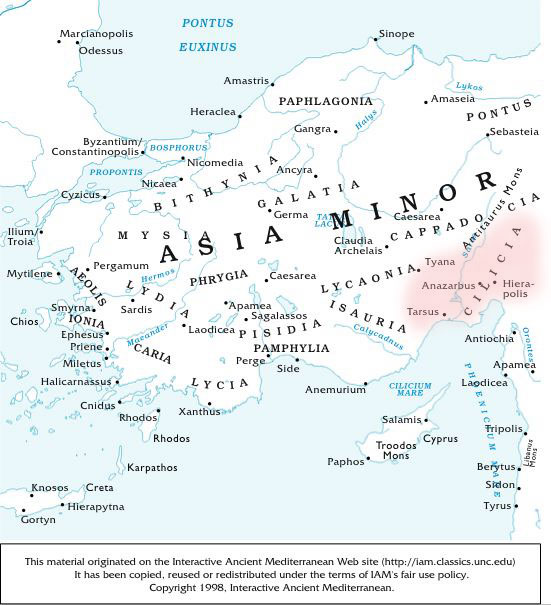A district in the southeast of Asia Minor, bounded by the Mediterranean on the south, Mount Amanus on the east, and Mount Taurus on the north. The western part of Cilicia is intersected by the offshoots of the Taurus, while in its eastern part the mountain chains inclose much larger tracts of level country; and hence arose the division of the country into Cilicia Aspera or Trachea, and Cilicia Campestris--the latter being also called Cilicia Propria.The first inhabitants of the country are supposed to have been of the Syrian race. The mythical story derived their name from Cilix, the son of Agenor, who started with his brothers, Cadmus and Phoenix, for Europe, but stopped short on the coast of Asia Minor, and peopled with his followers the plain of Cilicia.
The country remained independent till the time of the Persian Empire, under which it formed a satrapy, but it appears to have been still governed by its native princes.
Alexander subdued it on his march into Upper Asia, and after the division of his empire it formed a part of the kingdom of the Seleucidae. Its plains were settled by Greeks, and the old inhabitants were for the most part driven back into the mountains of Cilicia Aspera, where they remained virtually independent, practicing robbery by land and piracy by sea, till Pompey drove them from the sea in his war against the pirates; and, having rescued the level country from the power of Tigranes, who had overrun it, he erected it into a Roman province, B.C. 67-66. The mountain country was not made a province till the reign of Vespasian.
The Cilicians bore a low character among the Greeks and Romans; so that the Carians (Kares), Cappadocians (Kappadokes), and Cilicians (Kilikes) were called the "three bad K's" (tria kappa kakista). (Harpers Dictionary of Classical Antiquities, 1898)
